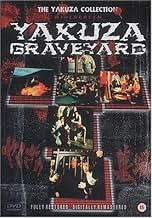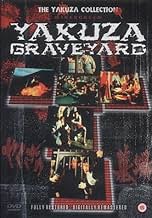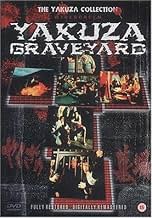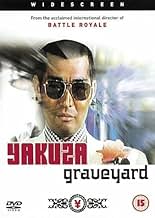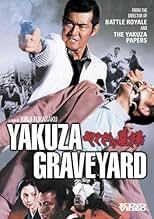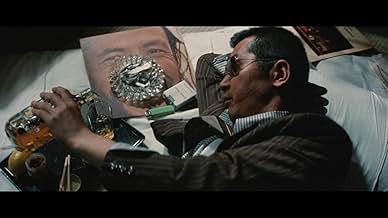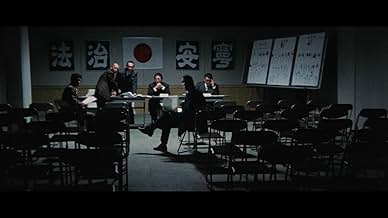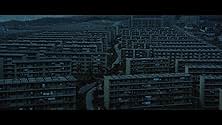AVALIAÇÃO DA IMDb
7,0/10
1,1 mil
SUA AVALIAÇÃO
Adicionar um enredo no seu idiomaA forceful new police precinct officer clashes with the local yakuza, contrasting his methods with his colleagues and becoming entangled with a woman connected to the criminal underworld.A forceful new police precinct officer clashes with the local yakuza, contrasting his methods with his colleagues and becoming entangled with a woman connected to the criminal underworld.A forceful new police precinct officer clashes with the local yakuza, contrasting his methods with his colleagues and becoming entangled with a woman connected to the criminal underworld.
- Prêmios
- 2 vitórias no total
Masataka Naruse
- Machinaga
- (as Tadashi Naruse)
Avaliações em destaque
This is a good movie. It's directed by Kinji Fukasaku who's a top director. There's lashings of style and substance to the film with a pace that never lets up throughout the film. It's like a gritty Pulp Fiction, but with the characters more low-key and more attention paid to the story line. Anyway, a good score, great acting and plenty of fights makes this a must see for anyone keen on the Yakuza or stories like The Limey. The story centers around an undercover cop, who is reassigned to a new precinct and sets out to put the mobsters behind bars. Along the way he gets involved with the people he is trying to put away, finding them to be the victims of fate rather than the villains they appear to be. This part of the story is offset around a larger picture of police corruption with the Yakuza pulling their strings. A cinematic masterpiece by a fascinating director.
Fukasaku's film, also known as "Yakuza Graveyard," is a compelling Japanese crime drama, from the director of "Battle Royale."
The plot centres on a 'cop on the edge,' played by Tetsuya Watari, a character far more disturbed than, say, Dirty Harry or Popeye Doyle from "The French Connection." Indeed, Watari's rebelliousness seems far more shocking in the context of Japanese society, where respect for authority and conformity are supposedly ingrained.
Equally interesting is the portrayal of the Yakuza. It is a crime family in the mould of "The Godfather," but more prosaic and less self-important than the clan created by Francis Ford Coppola. Above all, the film's theme is the lack of honour in Japanese society. The police are corrupt, and in many respects indistinguishable from the Yakuza. The central character develops a close relationship with one of the mobsters, whom he discovers is far more honourable and trustworthy than his police colleagues.
All in all, a fascinating and fast-paced movie.
The plot centres on a 'cop on the edge,' played by Tetsuya Watari, a character far more disturbed than, say, Dirty Harry or Popeye Doyle from "The French Connection." Indeed, Watari's rebelliousness seems far more shocking in the context of Japanese society, where respect for authority and conformity are supposedly ingrained.
Equally interesting is the portrayal of the Yakuza. It is a crime family in the mould of "The Godfather," but more prosaic and less self-important than the clan created by Francis Ford Coppola. Above all, the film's theme is the lack of honour in Japanese society. The police are corrupt, and in many respects indistinguishable from the Yakuza. The central character develops a close relationship with one of the mobsters, whom he discovers is far more honourable and trustworthy than his police colleagues.
All in all, a fascinating and fast-paced movie.
Watched this fairly late on a Friday night, so I'll keep this review brief, because bed is calling out to me.
I've been really into yakuza films lately, as I like crime films and I really dig Japanese cinema, and the yakuza sub-genre quite naturally combines the two. The thing I liked most about this particular one was its unique take on the "undercover cop infiltrating a criminal gang" premise.
In it, the central protagonist (the undercover cop) gets friendly with a gang, and they know pretty quickly where he's from. So the conflict isn't about whether or not he'll get found out; it's more about finding out on which side of the law his intentions truly lie (if he has any strong feelings one way or the other), and later, conflict arises when the police get angry at him for seeming to enjoy his interactions with the yakuza too much.
It's got a great premise and a strong opening half-hour. It's also really well-filmed throughout, with some great, frantic camerawork, and all the performances are solid. But it did get a bit too messy for my liking, with a plot that could have gone in numerous interesting directions, but didn't really seem to commit to one solidly enough. Maybe this was intended to mirror the feelings of the main character... or it could've been that the writing of the screenplay was just a bit rushed. I guess I'll never know for sure...
I've been really into yakuza films lately, as I like crime films and I really dig Japanese cinema, and the yakuza sub-genre quite naturally combines the two. The thing I liked most about this particular one was its unique take on the "undercover cop infiltrating a criminal gang" premise.
In it, the central protagonist (the undercover cop) gets friendly with a gang, and they know pretty quickly where he's from. So the conflict isn't about whether or not he'll get found out; it's more about finding out on which side of the law his intentions truly lie (if he has any strong feelings one way or the other), and later, conflict arises when the police get angry at him for seeming to enjoy his interactions with the yakuza too much.
It's got a great premise and a strong opening half-hour. It's also really well-filmed throughout, with some great, frantic camerawork, and all the performances are solid. But it did get a bit too messy for my liking, with a plot that could have gone in numerous interesting directions, but didn't really seem to commit to one solidly enough. Maybe this was intended to mirror the feelings of the main character... or it could've been that the writing of the screenplay was just a bit rushed. I guess I'll never know for sure...
Very good and not over long, this is a splendid violent Yakusa action film, although not bloody. There is rather much shouting and screaming but the camerawork is wonderful with many tricks, freezes and hand held work. I seem not to have seen much of the director Kinji Fukasaku expect of course of Battle Royale (2000). I loved seeing Meiko Kaji here and with before so much more like Lady Snowblood (1973) and the fantastic, Female Prisoner:701 Scorpion (1972). Cinematic all the way, a little confusing now and again but it is great with that stunning camera always going on and magnificent as thrilling all the time.
Even with its sombre and bleak tone that puts many of his other works to shame, once the smoke clears, there are more than enough corpses to fill this graveyard. Yakuza Graveyard is one of Kinji Fukasaku's more psychological approaches to his Yakuza films, dripping with nihilism and crammed full of energy, the film has all the hallmarks of Fukasaku's other movies. Here, he chooses to focus on the complicated and damaged psyche of Tetsuya Watari's investigator Kuroiwa with the chemistry he shares with Meiko Kaji's Keiko adding some beautiful tenderness to this gripping tale of violence and interpersonal deception. The camera tilts, dives and chases after the exceptional action, at no point becoming lost in the haze of bloody knuckles and muzzle flashes; combining this with Toshiaki Tsushima's prog rock style score and Yakuza Graveyard remains just as emotional, hard-hitting and badass as Fukasaku's other works, maintaining a standard of quality few could rival.
Você sabia?
- ConexõesReferences A Um Passo da Eternidade (1953)
Principais escolhas
Faça login para avaliar e ver a lista de recomendações personalizadas
- How long is Yakuza Graveyard?Fornecido pela Alexa
Detalhes
Contribua para esta página
Sugerir uma alteração ou adicionar conteúdo ausente

